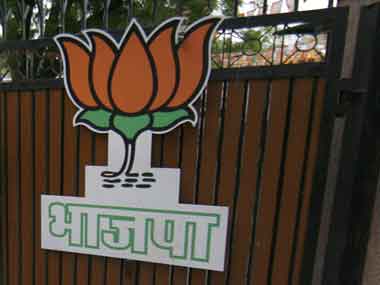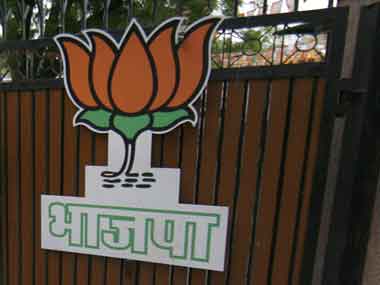With BJP governments in power in six of the seven states in the North East region, one hopes that many tricky issues facing the region will be addressed holistically. While individual states have their own set of worries yet there are many issues which the Central government has to handle deftly so as to ensure that permanent solutions are found to at least some of these problems which have been affecting the region for decades.[caption id=“attachment_4400217” align=“alignleft” width=“380”]  The BJP logo. Reuters[/caption] The greatest problem facing the North East is infiltration from Bangladesh. Though this is a serious concern for the entire region it is Assam, the worst affected state. Some protective mechanisms in the form of Inner line Permit (obtaining permission by visitors from other states to visit some of these states), as well as constitutional safeguards which restrict people from other states to own property, make it difficult for immigrants to enter some of these states. Moreover, because of the differences in facial features, migrants can be easily identified in the hill states. But that is not to say that migrants are not present in these states. While people of the region are demanding that illegal migrants should be identified and deported but on the contrary, the present Central government is planning to propose an amendment of the Citizenship Act of 1955 which will enable the religiously persecuted migrants to obtain citizenship thus distinguishing migrants on communal lines. The majority of the people of Assam is against the proposed amendment since it goes against the spirit of the Assam Accord which states that all illegal migrants from Bangladesh after 25 March 1971 would be deported. Another issue which has affected the region is unending demands for separate states, autonomous councils, and schedule tribe status from all quarters of the region. The Kukis in Manipur are demanding a separate state, Garos in Meghalaya for Garo state, IPFT(who with an alliance with BJP has done remarkably well in the recent election in Tripura) is also demanding a separate state. Bodos and Koch Rajbonghis in Assam are similarly demanding separate states. This along with a demand for ST status by many ethnic groups have led to frequent protests in the forms of blockades, bandhs, strikes etc. This besides putting pressure on the already poor economy is also seriously affecting the social fabric which is most undesirable. These frequent interruptions which affect the region have been accepted by the population as also by the concerned government as fait accompli. The political parties must share the blame since they make promises, particularly before elections, knowing fully well the ground realities. But the greatest challenge the Central government will be facing is formulating the impending Naga Accord to satisfy all stakeholders. Even before Neiphiu Rio was sworn in as the chief minister of Nagaland, he had declared that the Naga Accord will be signed on 10 August 2018. One does not know the rationale of his announcement. Although the Central government has announced time and again that the territorial integrity of the affected states will be maintained, however, the states namely Assam, Manipur and Arunachal Pradesh are not too comfortable. The question that keeps arising often is why the government is hesitant to declare the Framework of Agreement signed with NSCN (IM) in August 2016. The secrecy of the agreement is further compounding the problem. It is pertinent to state that except for the Mizo Accord signed in 1986 by the Central government with MNF leader Laldenga (who later become the first chief minister of Mizoram) most of the other accords have failed to achieve the desired results. The much publicised Assam Accord signed by Rajiv Gandhi with the All Assam Students’ Union (AASU) who had spearheaded the six-year-long Assam Agitation can now be called a non-starter. The agreement calls for Detection, Deletion (deletion of names of illegal migrants from voters list) and Deportation of illegal migrants. But there is no deportation agreement on illegal migrants with Bangladesh though there is an extradition treaty on convicts and under trial criminals. Moreover, Minister of State for Home Affairs Kirin Rijiiu on 7 March had disclosed in the Rajya Sabha that there was no proposal to sign another agreement on deportation with Bangladesh. Similar views were echoed by the president of Bangladesh during his recent visit to the northeastern region. Another such accord (Bodo Accord) which had led to the formation of Bodoland Territorial Autonomous District (BTAD) in 2001 is being criticised on the ground that Bodos constitute only about 32 percent of the total population. In the last two Lok Sabha elections from Kokrajhar constituency (only parliamentary constituency in BTAD), a non-Bodo candidate has won very comfortably. Therefore the Centre needs to do their groundwork properly before rushing to any such accord. To satisfy one ethnic group, the Centre should not antagonise other groups or other affected states otherwise these problems will surface in different forms as seen from time to time. The Centre should also initiate concrete measures to address some long outstanding interstate problems particularly boundary dispute of Assam with Nagaland, Mizoram, Arunachal Pradesh as well as Meghalaya. All these states except Arunachal Pradesh were carved out of Assam at some point in time. Similarly, Manipur also has boundary problem with Mizoram and Nagaland but they are not as pronounced as that of Assam. However, in spite of some interstate issues, the region is united on many important issues like harassment of the people from the North East particularly the student community in some parts of the country. The feeling is of neglect (perceived or otherwise) by the Centre, lack of sincerity by the Centre etc. These states want more involvement of the Centre in the development of the region. Of late the present government has taken a number of initiatives for development as well as for emotional connection with the region. The Armed Forces Special Power Act (AFSPA) is another sore point. The Centre has gradually lifted the act from many parts of the region but it can do still do much more in view of the fact that the ground situation has improved considerably in the region. Finally, the ruling party must not forget that unlike the Hindi heartland, North East is a multilingual, multireligious and plural society which has not seen much communal violence. Therefore, they should concentrate more on the development and good governance rather than trying to impose Hindutva philosophies. Nothing can be worse than this for the North East. Therefore, with almost all the states of the region headed by (or in alliance with other political parties), it is the ideal time for addressing these long pending issues. While BJP is definitely happy that they have now a strong presence in the region but the people of the most populous state of the region Assam are already getting disillusioned with the ruling party. Out of the 25 Lok Sabha seats in the region, Assam has the highest seats with 14 members. With BJP faring badly in the recent bye-elections and many regional parties like Shiv Sena, TDP indicating that they might go ahead alone in the coming Lok Sabha election, winning every seat will be important for BJP in the coming election. Also, the BJP needs to remember that there are many precedents in the North East wherein political loyalty has changed very fast. Therefore, the BJP needs to deliver results with good governance in the next few months.
BJP must not forget that unlike the Hindi heartland, North East is a multilingual, multireligious and plural society which has not seen much communal violence.
Advertisement
End of Article


)
)
)
)
)
)
)
)
)



